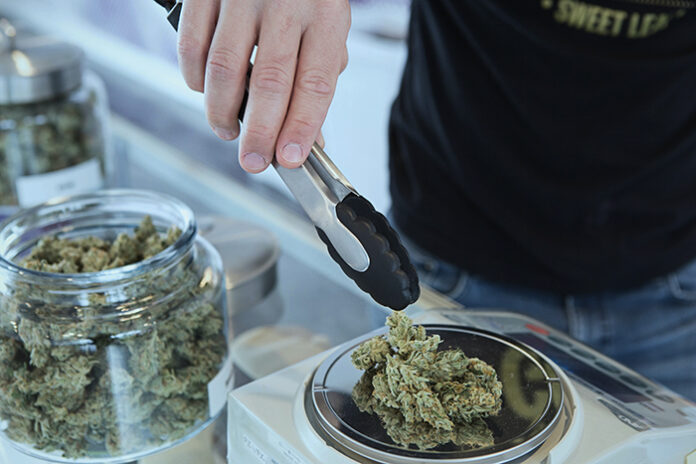
Cloverdale’s cannabis businesses are going to see a decrease in city taxes, following a 3-1 vote by the Cloverdale City Council on March 23. The council gave the green light to a resolution that amends the city’s existing blanket cannabis excise tax rate of 4.5% for cannabis businesses in favor of a tiered tax rate that varies tax amount by type of cannabis business.
Mayor Todd Lands held the dissenting vote and council member Marta Cruz was absent.
New rates
The amended, tiered rates are as follows:
● 3% for cultivation
● 1% for manufacturing
● 1% for distribution
● 3.5% for retail (storefront and non-storefront) and delivery
● 1% for other cannabis businesses allowed per the city’s municipal code
Type 12 businesses, or microbusinesses, will be treated slightly differently, City Manager David Kelley said, since they can operate as three different subtypes.
“What we propose is that the tax rate structure varies based on the sub-license type of the activity permitted under the Type 12 license,” Kelley said.
Microbusinesses do at least three of the following activities at one location: cultivation up to 10,000 total square feet; manufacturing; distribution or distribution transport-only; storefront or non-storefront retail.
According to the city council’s March 23 agenda, “If the Type 12 cannabis business was 50% retail/25% manufacturing/25% distribution in March, and the business received $1,000 for rent (gross revenue) in March, that rent would be attributed $500 (50%) to retail, $250 (25%) to manufacturing, and $250 (25%) to distribution. The tiered cannabis excise tax would in turn be applied to the gross revenue based on the allocation of the business activity as follows: retail – 3.5% of $500; manufacturing – 1% of $250; distribution – 1% of $250.”
During the council’s meeting on March 9, Councilmember Joe Palla requested that city staff bring back a forecast of what the city can expect to bring in in revenue from the tax if changed to a tiered rate, compared to what the city brings in now. Kelley said that while city staff didn’t prepare a forecast, they looked backward, “so that you could see the difference between what the cannabis industry paid and what they would have paid had the rates that are requested by the cannabis industry been in effect.”
According to city finance director Susie Holmes’ analysis, if the proposed rates had been in effect from the start of when the city began collecting cannabis tax, the city would’ve received $821,247 less than it did. For the first eight months of Fiscal Year 2021-22, it would’ve seen $149,234 less.
The reason behind the requested change
The council was asked to change the tax structure during a March 9 presentation to the Cloverdale City Council by Erin Gore, founder and CEO of Cloverdale-based microbusiness Garden Society, and Diana Schraner, co-owner of Cloverdale dispensary Red Door Remedies.
The suggested tiered rates were presented to the council by Gore.
“The cannabis industry is in a freefall right now. It’s in a state of extreme distress,” Gore said, noting that multiple cannabis businesses in Santa Rosa have closed their doors and that another business in Hopland is in the middle of liquidating their assets.
According to Gore, cannabis retailers shrunk 20-40% in the fourth quarter of 2021 and prices for cannabis fell from roughly $900 per pound to around $125. Changing the tax structure, she said, would help provide immediate relief for Cloverdale’s local cannabis industry.
When asked by Lands how the suggested rates were calculated — specifically why cultivators are being taxed harder than the manufacturers who are purchasing the product, why retailers are being taxed the hardest, and why manufacturing and distribution are being taxed the least — she said, “The cultivator growth potential to the city is flat, versus a distributor and a manufacturer, they put a lot of product through the door and out the door. So, distributors and manufacturers on an aggregate make significantly more gross receipts and therefore a lower tax rate still brings in a larger amount of money than a cultivator or a retailer. It’s about the business, it’s not about the flat rate compared to the different types of businesses.”
Council support, dissent and questioning
Throughout the duration of the meeting, Palla advocated that the city either hold a work session or assign the cannabis businesses discussions to a subcommittee so that it can spend more time looking at its current regulations, procedures and rates.
“We’ll have to revisit this annually, I think. It’s something that’s important,” said Palla after the initial council discussion, noting that he supports the tax change.
Palla was joined in support by Councilmember Melanie Bagby, who had also expressed her support for the change during the March 9 meeting.
“Before I was elected, we did this because of compassionate care,” Bagby said, referring to Cloverdale’s initial adoption of a cannabis ordinance. “We were out ahead of all of the other jurisdictions and I think that’s why we’re just a little off.”
“It’s important to me that we make sure that we keep this industry because once you lose an industry, you lose it,” Bagby said. “Once you lose cannabis dispensaries — people need to get their medicine — once we lose them, (people) have to travel for yet another product that would possibly not be available in Cloverdale.”
Cloverdale resident and Cloverdale Delivers owner Shawn Bovee spoke during public comment. He asked specifically who the “cloverdale cannabis industry” — referred to as such in the city’s agenda documents — refers to. Bovee said that he wasn’t made aware of any discussions surrounding the city’s cannabis tax, noting that he doesn’t support a reduction in local cannabis taxes and takes issue with lessening the amount of money from the city’s cannabis tax revenue that goes toward the Cloverdale Police Department — referencing another request made during the March 9 meeting that suggested that funds from the tax should go toward driving “equity community-based progress to repair the harm from the war on drugs.”
“What I’m looking for is that you’ve been given accurate, honest and transparent information from the Cloverdale cannabis industry,” Bovee said. “As many of you are well aware, we’ve had issues before. Ms. Gore does not represent me in any way at all.”
Bovee also questioned some of the numbers that Gore had presented at the March 9 meeting, saying that current market value for a cannabis cultivator is upward of $3,000 per pound — not the $250 per pound that the presentation slides state (during the March 9 meeting, Gore corrected the slides, saying that the price had dropped to $125 per pound).
“I run a delivery service, I have a microbusiness license for the nursery — I’m not here asking you to reduce my tax. If you do, do it for your neighbors, do it for your community. Not for Erin Gore, not for me, not for any cannabis cultivator,” Bovee said.
Mayor Todd Lands said that he has difficulty supporting the resolution because the tiered percentages are premature and “not given with a factual basis.”
“I think we really need to have some work done on this. We really do need to get all the licensees in the room to take a look at it. It shouldn’t stop this from moving forward — it comes back, we can adjust it either way, up or down, at any time,” Palla said.








